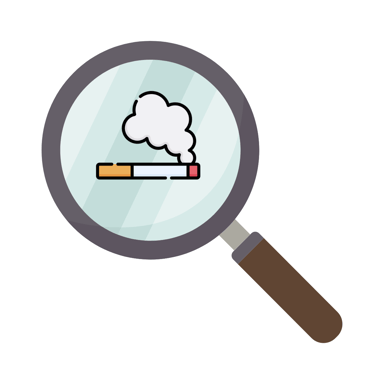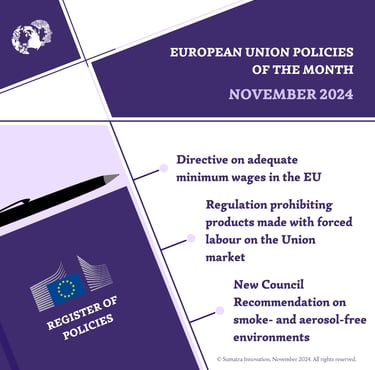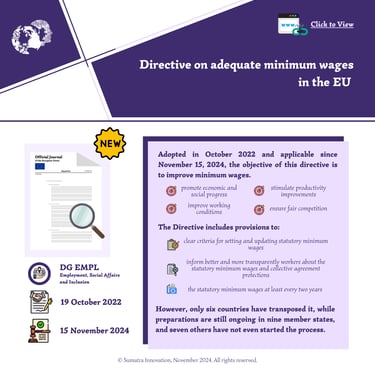Register of Policies / November 2024



1/ Directive on adequate minimum wages in the EU
The aim of the directive is to improve minimum wages, in order to promote economic and social progress, stimulate improvements in productivity, guarantee fair competition and improve working conditions. To this end, it establishes clear criteria for setting and updating statutory minimum wages (purchasing power, cost of living, wage distribution, productivity levels), seeks to provide workers with better and more transparent information on statutory minimum wages and collective agreement protections, and introduces an update of statutory minimum wages at least every two years (or four for countries with automatic indexation mechanisms). Following the proposal by the Commission in October 2020, and adoption by the Parliament and Council in October 2022, the transposition period for Member States ended on November 15, 2024. While in three EU countries (Germany, Ireland, Slovenia) no legislative action was necessary to meet the directive's requirements, many countries failed to meet the deadline set by the directive. In fact, only six countries have transposed the directive into national law (Belgium, Hungary, Latvia, Luxembourg, Poland, Romania). Nine Member States are still in the preparatory stages (Austria, Bulgaria, Croatia, Spain, Finland, Greece, Netherlands, Slovakia, Czech Republic), and seven other countries have not even begun the process (Cyprus, Estonia, France, Italy, Lithuania, Malta, Portugal). What's more, despite the fact that minimum wages in EU countries have risen in all member states (Source: Eurostat), some national governments are taking steps to reduce wages and collective bargaining coverage (Czechoslovakia, Luxembourg, Latvia) (Source: ETUC).
EU law: Directive (EU) 2022/2041
2/ Regulation on prohibiting products made with forced labour on the Union market
As Maria-Manuel Leitão-Marques, rapporteur of the Internal Market Committee in the European Parliament, pointed out, 27.6 million people are forced to work in many industries worldwide. On 27 November 2024, just over two years after the proposal was presented, the Regulation banning forced labor products from the EU market was adopted. By introducing specific measures to prevent the placing of products on the EU market, it complements national legislation implementing the Corporate Sustainability Due Diligence Directive (CSDDD) and its due diligence obligations. The term “forced labor” complies with the definition in Article 2 of Convention No. 29 of the International Labor Organization (ILO). Economic operators are prohibited from importing, manufacturing or exporting products to the EU market where forced labor has been used at any stage of production. This also applies to products sold online if the offer is directed at consumers in the EU. In order to identify possible violations, the Commission and the competent authorities of the Member States may carry out investigations, taking into account factors such as the extent and seriousness of the suspected forced labor, the size and economic resources of the economic operators, the quantity or volume of products on the EU market or the complexity of the supply chain. If an economic operator is found to be using forced labor, it must remove its products from the EU internal market by either donating, recycling or destroying them.
EU law: Regulation (EU) 2024/3015
3/ New Council Recommendation on smoke- and aerosol-free environments
The recommendation was jointly presented to the European Parliament on November 28, 2024 by the European People's Party (EPP), the Socialists and Democrats (S&D), Renew Europe and the Greens/EFA. Not satisfied, the European Conservatives and Reformists (ECR) looked to amend it to make a distinction between e-cigarettes and other heated tobacco products and traditional tobacco. Since it would drastically alter the original proposal to broaden the existing rules by addressing the risks posed by vapes and tobacco, the proposal was ultimately rejected, with 378 votes against, 152 in favor and 26 abstentions. The position of EU health ministers was very different when five days later, on December 3, 2024, the Council adopted the recommendation. However, while this means that the Council has recognized the importance of strengthening public health protections, it is up to member states to decide whether and how to implement the recommended measures, due to the non-binding nature of the recommendation under EU law.
EU law: COM/2024/55 final







